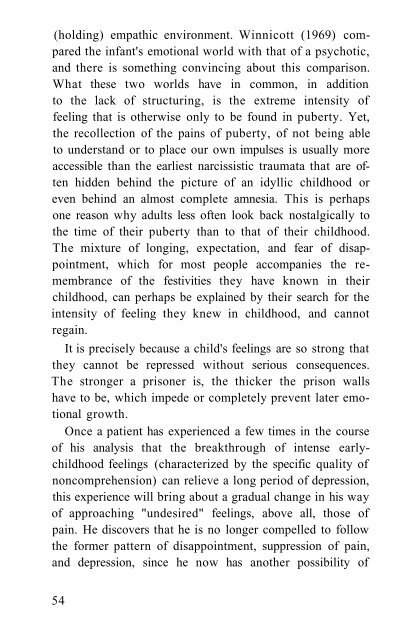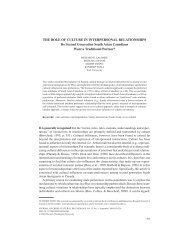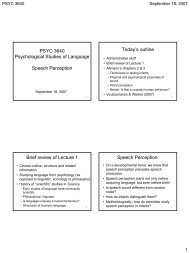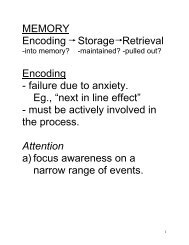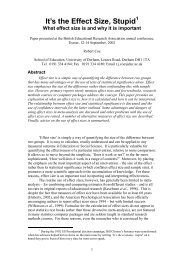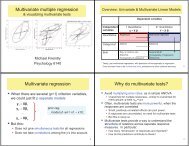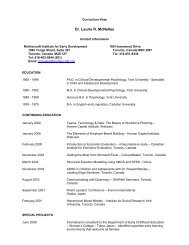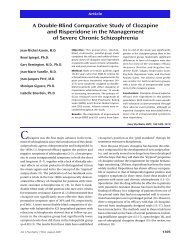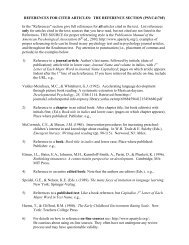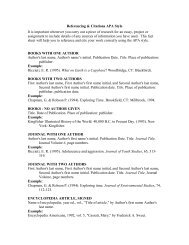The Drama of the Gifted Child (The Search for the True Self)
The Drama of the Gifted Child (The Search for the True Self)
The Drama of the Gifted Child (The Search for the True Self)
You also want an ePaper? Increase the reach of your titles
YUMPU automatically turns print PDFs into web optimized ePapers that Google loves.
(holding) empathic environment. Winnicott (1969) compared<br />
<strong>the</strong> infant's emotional world with that <strong>of</strong> a psychotic,<br />
and <strong>the</strong>re is something convincing about this comparison.<br />
What <strong>the</strong>se two worlds have in common, in addition<br />
to <strong>the</strong> lack <strong>of</strong> structuring, is <strong>the</strong> extreme intensity <strong>of</strong><br />
feeling that is o<strong>the</strong>rwise only to be found in puberty. Yet,<br />
<strong>the</strong> recollection <strong>of</strong> <strong>the</strong> pains <strong>of</strong> puberty, <strong>of</strong> not being able<br />
to understand or to place our own impulses is usually more<br />
accessible than <strong>the</strong> earliest narcissistic traumata that are <strong>of</strong>ten<br />
hidden behind <strong>the</strong> picture <strong>of</strong> an idyllic childhood or<br />
even behind an almost complete amnesia. This is perhaps<br />
one reason why adults less <strong>of</strong>ten look back nostalgically to<br />
<strong>the</strong> time <strong>of</strong> <strong>the</strong>ir puberty than to that <strong>of</strong> <strong>the</strong>ir childhood.<br />
<strong>The</strong> mixture <strong>of</strong> longing, expectation, and fear <strong>of</strong> disappointment,<br />
which <strong>for</strong> most people accompanies <strong>the</strong> remembrance<br />
<strong>of</strong> <strong>the</strong> festivities <strong>the</strong>y have known in <strong>the</strong>ir<br />
childhood, can perhaps be explained by <strong>the</strong>ir search <strong>for</strong> <strong>the</strong><br />
intensity <strong>of</strong> feeling <strong>the</strong>y knew in childhood, and cannot<br />
regain.<br />
It is precisely because a child's feelings are so strong that<br />
<strong>the</strong>y cannot be repressed without serious consequences.<br />
<strong>The</strong> stronger a prisoner is, <strong>the</strong> thicker <strong>the</strong> prison walls<br />
have to be, which impede or completely prevent later emotional<br />
growth.<br />
Once a patient has experienced a few times in <strong>the</strong> course<br />
<strong>of</strong> his analysis that <strong>the</strong> breakthrough <strong>of</strong> intense earlychildhood<br />
feelings (characterized by <strong>the</strong> specific quality <strong>of</strong><br />
noncomprehension) can relieve a long period <strong>of</strong> depression,<br />
this experience will bring about a gradual change in his way<br />
<strong>of</strong> approaching "undesired" feelings, above all, those <strong>of</strong><br />
pain. He discovers that he is no longer compelled to follow<br />
<strong>the</strong> <strong>for</strong>mer pattern <strong>of</strong> disappointment, suppression <strong>of</strong> pain,<br />
and depression, since he now has ano<strong>the</strong>r possibility <strong>of</strong><br />
54


